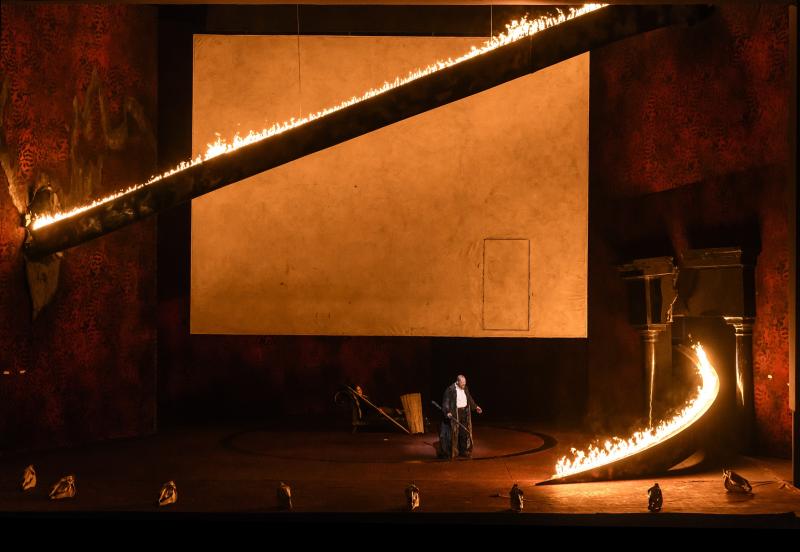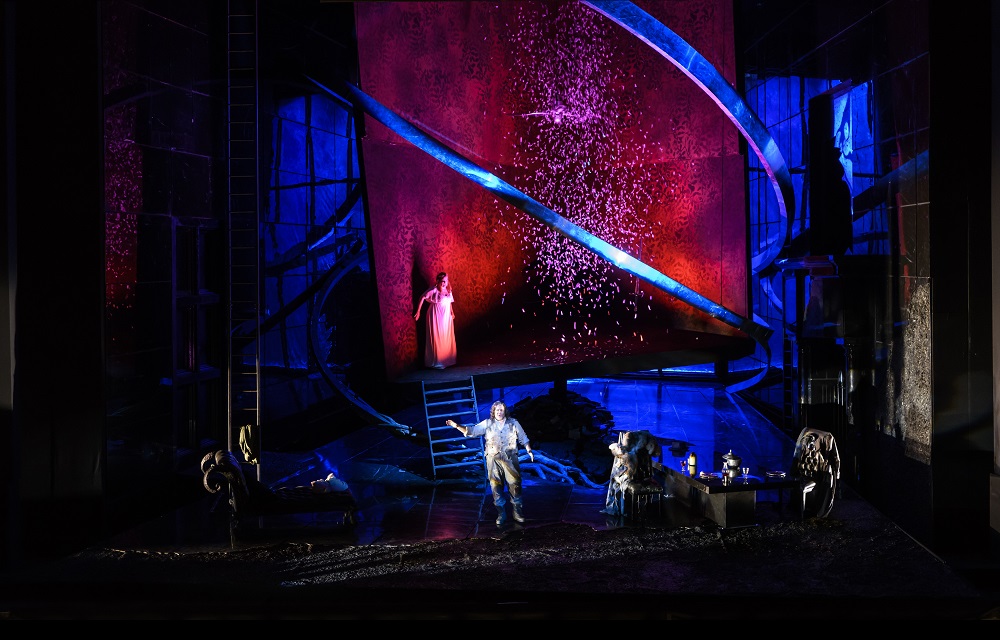Die Walküre, Royal Opera review – putting family before sex | reviews, news & interviews
Die Walküre, Royal Opera review – putting family before sex
Die Walküre, Royal Opera review – putting family before sex
Strong casting and unreliable chemistry in the last hurrah for a well-grooved staging

Perched alone and fearful in her hut as the curtain rises on Die Walküre, Sieglinde clutches and then throws aside a grimy teddy-bear. Story time is over. The nymphs and gold and bickering gods all belong in the past, to the ‘preliminary evening’ of Das Rheingold, or so Sieglinde might think. The real drama of Wagner's Ring begins here.
Other false comforts and dreams of dominion bind the Victorian age of the Ring’s composition to subsequent eras of industrialised exploitation, expansion and decline in Stefanos Lazaridis’s designs for this Mime’s brew of symbols and signifiers: a broken wardrobe in need of a witch, cracked marble fireplace and worn-out black-leather trimmings. The rubble of trapped power belongs not only to late capitalism but to Wagner productions worldwide, and Warner is having his cake and eating it.
Warner reliably teases out the red threads of money and power in the Ring. Family, too: as Siegmund, Stuart Skelton is recognisably a son to Wotan as well as father to Siegfried, rhapsodic in distress and impulsive in action. He refrained from showboating his cries of "Wälse" and dared some of his quietest singing for the lyric paean of "Winterstürme" (the scene pictured below), trusting that the steel in his voice would cut through like the blade of Notung glinting above him. Emily Magee’s Sieglinde won hardly less sympathy, resolute and vulnerable in equal measure, less vocally imposing than her Empress in Die Frau ohne Schatten but always steady even when challenged by the orchestra at full tilt, at least until her final, impassioned plea of "O hehrstes Wunder". She was heard better higher up in the house where the seats are cheaper and the balance fairer between stage and pit. Ain Anger sang a notably thoughtful Hunding, no brutish thug but rather a bit-part or rejected "asset" in the mould of the sinister film empires (The Matrix, Bourne, Wellesian fantasies) that Warner’s production increasingly resembles.  But Die Walküre demands that we talk about sex, and there was perplexingly little of the erotic charge which is the lifeblood of the first act and fills its many orchestral interludes with meaning. In the pit, Antonio Pappano continues to refine a honeyed sostenuto in Wagner. The solo and divided cello episode sounds more than ever like an out-take from Rossini’s William Tell, not unreasonably. He whips up a terrific storm at the act’s opening and close, he pushes time and space to the limits of sense when setting the scene for the Todesverkündigung (Brünnhilde’s annunciation of Siegmund’s death), drawing out the most Bellinian aspects of Wagner’s orchestration, and performs naturalistic wonders with the rides of the Valkyries’ steeds as they cut across each other in the third act’s prelude.
But Die Walküre demands that we talk about sex, and there was perplexingly little of the erotic charge which is the lifeblood of the first act and fills its many orchestral interludes with meaning. In the pit, Antonio Pappano continues to refine a honeyed sostenuto in Wagner. The solo and divided cello episode sounds more than ever like an out-take from Rossini’s William Tell, not unreasonably. He whips up a terrific storm at the act’s opening and close, he pushes time and space to the limits of sense when setting the scene for the Todesverkündigung (Brünnhilde’s annunciation of Siegmund’s death), drawing out the most Bellinian aspects of Wagner’s orchestration, and performs naturalistic wonders with the rides of the Valkyries’ steeds as they cut across each other in the third act’s prelude.
So what was missing? As much and as little, perhaps, as simple chemistry, between principals mostly new to a well-grooved staging. Stepping into the biggest boots of all was John Lundgren for what has hitherto been Bryn Terfel’s Wotan. A figure commanding attention even when delivering most of his second-act monologue in a barked stage whisper, Lundgren is not a god weary of the world he has created so much as angry with it. It’s a restless, absorbing and detailed portrait worth seeing even for seasoned Ring goers, though not on the first night supported by the requisite stamina for the role: he had noticeably tired by the time of the third act’s Farewell.

More consistently persuasive and authoritative were Sarah Connolly and Nina Stemme, who as Fricka and Brünnhilde gave what amounted to masterclasses in Wagnerian delivery. Connolly’s claim over the music of Brünnhilde’s arrival to delight in Wotan’s despair was a highlight of the evening, and her ownership of the part since its 2012 revival is as absolute as her mastery of her husband. Everyone involved likewise raised their game in partnership with Stemme, for whom this is, incredibly, her first fully staged Brünnhilde in the UK. Daniel Barenboim’s Proms Ring in 2013 offered just a foretaste of what British audiences have been missing, a complete Brünnhilde for our time, impetuous from the outset yet never aggressive, blending with a superb team of Valkyries (pictured above), always learning and drawing strength from the characters around her. From now on, the Ring is her story.
- Der Ring des Nibelungen continues at The Royal Opera on Saturday 29 September. The cycle is being recorded for future broadcast on BBC Radio 3.
- Read more opera reviews on theartsdesk
rating
Explore topics
Share this article
The future of Arts Journalism
You can stop theartsdesk.com closing!
We urgently need financing to survive. Our fundraising drive has thus far raised £49,000 but we need to reach £100,000 or we will be forced to close. Please contribute here: https://gofund.me/c3f6033d
And if you can forward this information to anyone who might assist, we’d be grateful.

Subscribe to theartsdesk.com
Thank you for continuing to read our work on theartsdesk.com. For unlimited access to every article in its entirety, including our archive of more than 15,000 pieces, we're asking for £5 per month or £40 per year. We feel it's a very good deal, and hope you do too.
To take a subscription now simply click here.
And if you're looking for that extra gift for a friend or family member, why not treat them to a theartsdesk.com gift subscription?
more Opera
 Giustino, Linbury Theatre review - a stylish account of a slight opera
Gods, mortals and monsters do battle in Handel's charming drama
Giustino, Linbury Theatre review - a stylish account of a slight opera
Gods, mortals and monsters do battle in Handel's charming drama
 Susanna, Opera North review - hybrid staging of a Handel oratorio
Dance and signing complement outstanding singing in a story of virtue rewarded
Susanna, Opera North review - hybrid staging of a Handel oratorio
Dance and signing complement outstanding singing in a story of virtue rewarded
 Ariodante, Opéra Garnier, Paris review - a blast of Baroque beauty
A near-perfect night at the opera
Ariodante, Opéra Garnier, Paris review - a blast of Baroque beauty
A near-perfect night at the opera
 Cinderella/La Cenerentola, English National Opera review - the truth behind the tinsel
Appealing performances cut through hyperactive stagecraft
Cinderella/La Cenerentola, English National Opera review - the truth behind the tinsel
Appealing performances cut through hyperactive stagecraft
 Tosca, Royal Opera review - Ailyn Pérez steps in as the most vivid of divas
Jakub Hrůša’s multicoloured Puccini last night found a soprano to match
Tosca, Royal Opera review - Ailyn Pérez steps in as the most vivid of divas
Jakub Hrůša’s multicoloured Puccini last night found a soprano to match
 Tosca, Welsh National Opera review - a great company reduced to brilliance
The old warhorse made special by the basics
Tosca, Welsh National Opera review - a great company reduced to brilliance
The old warhorse made special by the basics
 BBC Proms: The Marriage of Figaro, Glyndebourne Festival review - merriment and menace
Strong Proms transfer for a robust and affecting show
BBC Proms: The Marriage of Figaro, Glyndebourne Festival review - merriment and menace
Strong Proms transfer for a robust and affecting show
 BBC Proms: Suor Angelica, LSO, Pappano review - earthly passion, heavenly grief
A Sister to remember blesses Puccini's convent tragedy
BBC Proms: Suor Angelica, LSO, Pappano review - earthly passion, heavenly grief
A Sister to remember blesses Puccini's convent tragedy
 Orpheus and Eurydice, Opera Queensland/SCO, Edinburgh International Festival 2025 review - dazzling, but distracting
Eye-popping acrobatics don’t always assist in Gluck’s quest for operatic truth
Orpheus and Eurydice, Opera Queensland/SCO, Edinburgh International Festival 2025 review - dazzling, but distracting
Eye-popping acrobatics don’t always assist in Gluck’s quest for operatic truth
 MARS, Irish National Opera review - silly space oddity with fun stretches
Cast, orchestra and production give Jennifer Walshe’s bold collage their all
MARS, Irish National Opera review - silly space oddity with fun stretches
Cast, orchestra and production give Jennifer Walshe’s bold collage their all
 Káťa Kabanová, Glyndebourne review - emotional concentration in a salle modulable
Janáček superbly done through or in spite of the symbolism
Káťa Kabanová, Glyndebourne review - emotional concentration in a salle modulable
Janáček superbly done through or in spite of the symbolism
 Buxton International Festival 2025 review - a lavish offering of smaller-scale work
Allison Cook stands out in a fascinating integrated double bill of Bernstein and Poulenc
Buxton International Festival 2025 review - a lavish offering of smaller-scale work
Allison Cook stands out in a fascinating integrated double bill of Bernstein and Poulenc
